- Home
- Muriel Spark
Hothouse by the East River Page 2
Hothouse by the East River Read online
Page 2
Paul turns to go to the kitchen for ice. At the door he turns again.
His heart thumps for help. ‘Help me! Help me!’ cries his heart, battering the sides of the coffin. ‘The schizophrenic has imposed her will. Her delusion, her figment, her nothing-there, has come to pass.’
‘Did Kiel recognize you, Elsa?’
‘I think so. I saw Garven today.’
‘I’m in danger from Kiel, and all you can talk about is your own problem.’
‘I don’t have a problem. It was your idea that I should go to Garven.’
He is dressing; she comes through from her bathroom into her bedroom.
‘Garven has the problem anyway,’ she says. The problem of me is his, not mine—’ The light from his table falls upon her. Her shadow bends towards it.
He holds his breath—‘Let me out! Let me out!’
He will not sleep beside her in bed any more. Never again, never again. No man can sleep with a woman whose shadow falls wrong and who gets light or something from elsewhere.
He watches her walk into her bedroom. The last time they dined out the hostess had to fuss with the candles at the table, which was unaccountably darkened over. Or was it the time before that? The last time, maybe, was when they were all looking at the newly acquired Kandinsky: ‘Just stand aside a little, Elsa—Paul—standing in the light? There’s a shadow … who? … how?’
Nobody has really noticed it, and yet everyone has noticed it. Pierre and Katerina—perhaps they have talked of it between themselves:
‘Mother is terrifying. Have you seen how her shadow falls?’ No, they wouldn’t say that. Pierre would telephone to Garven, perhaps. No, Garven would think him crazy.
Has Garven noticed?
No, Garven is too busy with his problem.
Paul shouts into the bedroom, ‘You don’t care what happens to me! Can’t you realize what it means, that Kiel is alive and has come here to New York?’
‘Have him checked,’ she replies in a practical voice as if it were a question of a cavity in a tooth.
‘I’ve had him checked,’ he shouts. ‘He’s got every cover. There’s a Helmut Kiel, deceased, on the prison records at Hamburg. He’s got a new name, obviously; new papers, a job in a shoe store, everything. What do you care?’
He feels easier after this row. Helmut Kiel is a definite danger to his life, but preferable to the torture of that something of Elsa’s out there on the river.
‘Are you ready?’ he says.
Or perhaps he says, ‘Now, pull yourself together.’
She says, ‘I’m ready, are you? I don’t have a problem. Katerina …”
Pierre’s apartment in East Seventy-sixth Street is beautifully cool this summer. Paul envies the silent air-conditioning system of his son’s apartment, distributed from a noiseless central equipment throughout the house, and once more decides to move from the apartment by the East River down there in Forty-fourth Street where the air-conditioners hum separately in each room.
‘Look,’ says Paul, ‘it was before you were born, a long time ago.’
‘But Father, be reasonable and methodical, that’s all I say. See a lawyer. Have the F.B.I. make a thorough investigation. And if you can’t leave it at that, have a private firm investigate the man.’
Paul does not want to leave this evenly cool apartment. He lingers, even having said all he has wanted to say, even to the point of beginning again. ‘It was when your mother and I were young, in England, during the war…’
The apartment is cool in its decorations. Very little furniture, like a psychiatrist’s consulting room. Elsa has said she enjoys a sense of repose when she visits her analyst.
‘Then I’ve got the problem of your mother on top of it,’ Paul says.
‘Leave that to Garven. It’s Garven’s problem.’
‘Oh, is it? Oh, is it Garven’s problem?’ Paul says. ‘Sometimes I wonder.’
‘Wonder what?’ says Pierre with a sudden stare that betokens, surely, an innocent question.
‘Have you ever thought there was something strange about your mother?’ Paul says.
‘Yes. What else does she see Garven for? But we shouldn’t let her go away again. Not into the clinic, not there. It isn’t necessary. Not with modern drugs and therapy and so on.’ Pierre is anxious for him to leave; he has something else to do, or is perhaps afraid that his father will say too much.
‘I think about Kiel, real name Mueller, that’s the main problem.’ Paul says. ‘Anything you can think of, let me know. I just wanted to put you in the picture, Pierre, in case anything happens to me.’
‘Don’t worry.’ Pierre looks out of the window.
Pierre, looking out of the window, resembles his mother more than usual.
His shadow falls in folds on the curtain, cast by the lamp behind him, his shadow falls where it should fall. It moves as Pierre moves. The father says, ‘I want you to have the whole picture, Pierre.’ He watches his son’s movements as if almost hoping the tall young man could cause things to happen by the mere waving of that wand, his body.
‘I have the picture, I think.’
‘Yes, but the picture, the whole picture and nothing but the picture,’ Paul says. ‘Pierre, it’s a complex matter. If your mother can’t rouse herself or feel anything about my predicament with Kiel, then I’m in all the greater danger, Pierre.’
Pierre looks round, briefly and with an irritated opening of his lips, as if to say ‘Don’t “Pierre” me.’ After a while he sits down and says, ‘Mother is no fool. She doesn’t panic, that’s all.’
‘Panic! I don’t say she ought to panic. I say she might show some concern. After all, she saw the man. It was your mother who first saw him in the shoe store. She simply told me. She sat there calmly and told me, as if it were something as meaningless as a pair of shoes.’
‘Shoes have meaning, Father.’
Paul wants to hit his son, and scream at him that his rotten education has made him unfit for the modern world, and it has been his mother’s rotten money that has sent him the rounds of the world to every school of Art History that money can buy. Paul lays his palms on the arms of his chair and for the usual reason that deters people from violence of word and deed, refrains from it. He says, ‘She sits looking out. She remembers Kiel very well. She remembers what happened when we were engaged during the war. She knows that Kiel was a double agent and went to prison after the war. She heard that he died in prison and now she’s seen him in New York. But if one makes any appeal to her sense of its significance she’s not interested. She’s away and out of reach. She looks out of the window and I stand there like a grocer who’s come to demand payment of an overdue bill from, say, Michelangelo while he’s up on the scaffold of the Sistine Chapel, painting the ceiling. She says, “Go and get a drink.” That’s what she says, and I’m only a little figure far beneath her and her thoughts.’
Pierre looks interested at last, either because he is interested or because he is intelligent enough to put up a show at this point. He has turned from the window and has sat in the chair opposite Paul, his left arm so placed on the arm-rest, perhaps by intention, that he can see the time at a glance.
Pierre says, ‘She’s more—’ before the doorbell rings. He raises his eyebrows, rises, and goes to press the button that will release the street door. He returns for the few moments that it takes for the lift to ascend, now speculating on who the visitor can be. He lets in a flabby, pale-fleshed man with a crew-cut and sandy, pink-rimmed eyes, wearing pale-blue trousers and a loose white shirt hanging over them. Paul cannot decide upon his age, the man’s features being packed away in flesh.
His name is Peregrine. Perhaps it is his first or middle name, perhaps his last. ‘Peregrine—my father. Father—Peregrine,’ Pierre says.
‘I have to go,’ says Paul.
As Pierre lets his father out he says, ‘I doubt very much that the man you’ve seen here in New York is the Kiel you’ve been talking about. I think you’ve made some mistake.’
/>
2
THREE YEARS AGO, ELSA said, ‘Perhaps I’m imagining things, as Caesar said to his wife at dawn on the Ides of March.’
‘Oh, come now,’ Paul said. ‘There’s a difference between your case and his.’
On that occasion Pierre and Katerina had been in the room. Katerina was starting her last college vacation.
‘Where did you read that about Caesar?’ Katerina said.
‘Oh how you bore me,’ said her mother. ‘So bloody literal.’
Katerina said, ‘I don’t understand, Mother.’
‘We’re not all gifted with understanding,’ Elsa said, and fixed her gaze on the windows.
‘You used to be different towards us,’ Pierre said. ‘You used to be sweet and patient. Not that it matters.’
‘There’s a time for everything. It’s your turn to be sweet and patient,’ Elsa said.
‘They show a lot of sweetness and a lot of patience, Elsa,’ said Paul. ‘And,’ he said, ‘I try my best, too.’
‘Where did you read that about Caesar, Mother?’ Katerina said.
‘I didn’t read it.’
‘Then how do you know he said it?’
Elsa laid her forehead on the window. She started to laugh. The father left the room; the daughter followed, then the son.
That was only three years ago. But now it is long years ago, when they are recently engaged and are working together in England at the Compound, during the second world war. The Compound is a small outpost of British Intelligence in the heart of the countryside. Paul says to Elsa, ‘Did you hear what happened to Kiel?’
‘No—what?’ she says.
‘He’s been sent back to the prisoner of war camp.’
‘Which Kiel? You mean Claus Kiel?’ she says.
‘Oh, him—no, not him, he’s harmless. I mean Helmut.’
‘But I saw Helmut last night. He was here.’
‘Yes, well he was sent back this morning.’
‘What for?’ she says.
‘He started a fight in his billet, apparently. Smashed a window.’
‘Helmut smashed a window? Last night?—But that’s not like him, you know. He’s a serious type, Paul. Someone must have provoked him.’
‘No.’ Paul says, ‘they didn’t.’
‘Well, why did he start the fight?’ she says.
‘He must have wanted to be sent back to camp. The bloody fools here don’t see that. All they care about are the regulations. They’ve got no psychology. The German workers have got to keep order, so he’s been sent back to the camp for bad conduct—which is obviously what he wanted.’
‘Why should he want to go back?’ she says.
‘I don’t know. I thought you might know.’
She starts walking over to the hut where they work and he walks with her. The spring sun has come out. She pulls the wide belt of her dress tighter into her waistline and slings the short strap of her bag over her shoulder. She says, ‘There could be a lot of reasons. It isn’t our business, it’s for Security to find out.’
He says, ‘They don’t seem to think he had any reason to want to get out of working for us. They seem to think he just lost control and broke out into violence.’
She stops at the door of the hut. She looks in the doorway and speaks with her head still turned away from him.
‘Well maybe he did just lose control. Prisoners often do,’ she says, ‘for one does forget sometimes that these German collaborators are still prisoners.’
‘But I wouldn’t have thought Kiel would lose control as easily as that, would you?’
‘No, I wouldn’t quite honestly. It’s a shock.’
‘When did you see him last night?’ Paul says.
‘He was here, working—Where do you think I saw him? Where else would you think?’
‘I said “when” not “where”. I’m not suggesting that you’ve broken any rules, Elsa. I’m not a security officer.’
She says, ‘He was here till midnight and went home on the bus with the others. He was perfectly all right, then. Perfectly cheerful. Perfectly … Of course it must be nerve-racking for them when they know all the time they’ve ratted on their own country. I don’t know what to think, really. What do you think?’
Paul looks at the clock on the wall inside the doorway, and says he has to go. He looks at her as if to ask if she has anything more to say.
She says, ‘Let me know if you hear anything more, won’t you, Paul?’
‘Are you having supper in the canteen?’
‘Yes, but I won’t get away till nine.’
‘I’ll see you there at nine,’ he says.
The Compound is hard asphalt in the primrose light, early spring of 1944, England.
‘I’m a spent volcano. Just a slag-heap with a hole down the middle and a thin wisp of curly smoke coming up out of my hair.’
So she drawls, in these days of her languid vigour, while Paul takes off his sun-glasses, breathes on the lenses, and wipes them with his pocket handkerchief, one by one; then he puts on the glasses again, but still cannot understand the girl.
Not long afterwards, Paul is called in for questioning by a security officer.
This security officer, Colonel Tylden, has been appointed sagely. He is a military man with a limited imagination which, even in its limited capacity, he seldom uses. Consequently he is less likeable, less highly regarded but more just and more efficient than other, more brilliant and subtle, investigators whose courteous looks and hysterical hearts combine to put up a brilliant performance in the course of interrogation, but who probe so often in directions deviating from facts to which they never return.
‘Sit down.’
Paul sits down.
‘Elsa,’ says the man, ‘slept with Kiel.’
Paul frowns, and, looking out of the upper pane of the window, gives a sigh of exasperation which is meant to convey the fact that he knows the colonel’s methods and is not to be impressed.
The colonel says, ‘Which of course you know.’
‘No,’ says Paul wearily, ‘and neither do you.’
The man shrugs his eyebrows. He starts afresh:
‘Not Claus Kiel, of course. Helmut.’
Paul smiles at this truism within the hypothesis that Elsa has slept with anyone called Kiel. Paul’s smile is tense, soon ended. But the officer then grants a long-drawn smile and says, ‘Yes, of course. An unnecessary distinction in this context. We can hardly suspect little Claus of having a girl in his bunker.’
‘Bunker? How could they have sex in the bunker, with anyone liable to come in? And those cots—narrow …’
He is thinking of the narrow sleeping-berths set up in the small rooms where the late-duty workers may rest between broadcasts.
‘She used to go and rest in the bunker. Kiel’s bunker. She admits that. Apparently she went in frequently between transmissions.’
‘Oh well, I haven’t been on late duty for months, so I really couldn’t say about that. I wouldn’t have attached importance to it, anyway. Elsa obviously doesn’t.’
‘Why not?’
‘She hasn’t mentioned to me anything about resting in a bunker, or anything about Kiel or Kiel’s bunker.’ Paul knows, as soon as he has spoken, the feebleness of this protest. He looks at the security man, waiting for his gentle smile of sympathy for one deceived in love.
But the man behaves well and responds in a serious tone, although, of course he can only say, ‘It’s understandable that she hasn’t mentioned it.’
‘And equally,’ says Paul, ‘understandable that she hasn’t mentioned it, if it means nothing to her, going into Kiel’s bunker for a lie-down.’ He is immediately aware of his error in uttering that ‘if’. He adds, ‘Since it means nothing to her.’ And he is about to elaborate further on Elsa’s innocence when he realizes that the interrogator is now waiting for a real outburst of that indignation which expresses inner doubts. Paul remembers he is a foreigner and decides to shut up.
The ma
n waits long enough, hopefully, before speaking again. He states, ‘You and Elsa—there has been a little estrangement lately.’
‘No,’ says Paul, as if answering a question.
‘You haven’t been about together so much, lately.’
Paul looks at him in a puzzled manner.
The man looks away, and, as if making a rather sad observation, says, ‘You don’t see much of each other these days.’
‘Very true,’ says Paul, and is not to be drawn into what the man already knows. Formerly, Paul was able to go for long daily walks with Elsa in the countryside surrounding the Compound. Elsa was then on night duty and he on afternoon duty, so that their free time at the Compound coincided by two busy hours only; but their leave has always been arranged to coincide, so that they can go up to London for four days each fortnight, as they do, staying at the Strand Palace Hotel.
‘I mean,’ says the man in answer to the silence, ‘that you aren’t seen together as much as you used to be. Of course, you take your leave together, but I mean to say, Elsa, of course, went on late duty at her own request.’
‘Not true,’ Paul says, taking no chances.
The officer opens a desk and takes out a bunch of keys, then he rises and goes over to the filing cabinet, where he inserts and turns a key. Paul is not sure if the cabinet drawer has not opened a little too easily, he is not sure if it was locked in the first place. The man has removed a blue cardboard file and is flipping through the papers inside it. He stops at one paper, half-removes it for a moment and concentrates his eyes upon it. Then he replaces the paper neatly, replaces the folder, shuts the drawer, locks it, tries it, and returns to his desk. There, he opens the drawer and replaces the keys.
He says, ‘She applied for late duty,’ and takes out a pocket notebook in which he writes something in pencil.
Paul says nothing. The performance looks unlikely, but it might equally well be genuine. Elsa had complained to him about being put on night duty, she had said she was trying to get out of it, and later had told him she had failed; it was her turn to work for six months on a shift beginning at four in the afternoon and ending some time between midnight and two o’clock the next morning.
His heart thumps for help. ‘Help me! Help me!’ cries his heart, battering the sides of the coffin. ‘The schizophrenic has imposed her will. Her delusion, her figment, her nothing-there, has come to pass.’
‘Did Kiel recognize you, Elsa?’
‘I think so. I saw Garven today.’
‘I’m in danger from Kiel, and all you can talk about is your own problem.’
‘I don’t have a problem. It was your idea that I should go to Garven.’
He is dressing; she comes through from her bathroom into her bedroom.
‘Garven has the problem anyway,’ she says. The problem of me is his, not mine—’ The light from his table falls upon her. Her shadow bends towards it.
He holds his breath—‘Let me out! Let me out!’
He will not sleep beside her in bed any more. Never again, never again. No man can sleep with a woman whose shadow falls wrong and who gets light or something from elsewhere.
He watches her walk into her bedroom. The last time they dined out the hostess had to fuss with the candles at the table, which was unaccountably darkened over. Or was it the time before that? The last time, maybe, was when they were all looking at the newly acquired Kandinsky: ‘Just stand aside a little, Elsa—Paul—standing in the light? There’s a shadow … who? … how?’
Nobody has really noticed it, and yet everyone has noticed it. Pierre and Katerina—perhaps they have talked of it between themselves:
‘Mother is terrifying. Have you seen how her shadow falls?’ No, they wouldn’t say that. Pierre would telephone to Garven, perhaps. No, Garven would think him crazy.
Has Garven noticed?
No, Garven is too busy with his problem.
Paul shouts into the bedroom, ‘You don’t care what happens to me! Can’t you realize what it means, that Kiel is alive and has come here to New York?’
‘Have him checked,’ she replies in a practical voice as if it were a question of a cavity in a tooth.
‘I’ve had him checked,’ he shouts. ‘He’s got every cover. There’s a Helmut Kiel, deceased, on the prison records at Hamburg. He’s got a new name, obviously; new papers, a job in a shoe store, everything. What do you care?’
He feels easier after this row. Helmut Kiel is a definite danger to his life, but preferable to the torture of that something of Elsa’s out there on the river.
‘Are you ready?’ he says.
Or perhaps he says, ‘Now, pull yourself together.’
She says, ‘I’m ready, are you? I don’t have a problem. Katerina …”
Pierre’s apartment in East Seventy-sixth Street is beautifully cool this summer. Paul envies the silent air-conditioning system of his son’s apartment, distributed from a noiseless central equipment throughout the house, and once more decides to move from the apartment by the East River down there in Forty-fourth Street where the air-conditioners hum separately in each room.
‘Look,’ says Paul, ‘it was before you were born, a long time ago.’
‘But Father, be reasonable and methodical, that’s all I say. See a lawyer. Have the F.B.I. make a thorough investigation. And if you can’t leave it at that, have a private firm investigate the man.’
Paul does not want to leave this evenly cool apartment. He lingers, even having said all he has wanted to say, even to the point of beginning again. ‘It was when your mother and I were young, in England, during the war…’
The apartment is cool in its decorations. Very little furniture, like a psychiatrist’s consulting room. Elsa has said she enjoys a sense of repose when she visits her analyst.
‘Then I’ve got the problem of your mother on top of it,’ Paul says.
‘Leave that to Garven. It’s Garven’s problem.’
‘Oh, is it? Oh, is it Garven’s problem?’ Paul says. ‘Sometimes I wonder.’
‘Wonder what?’ says Pierre with a sudden stare that betokens, surely, an innocent question.
‘Have you ever thought there was something strange about your mother?’ Paul says.
‘Yes. What else does she see Garven for? But we shouldn’t let her go away again. Not into the clinic, not there. It isn’t necessary. Not with modern drugs and therapy and so on.’ Pierre is anxious for him to leave; he has something else to do, or is perhaps afraid that his father will say too much.
‘I think about Kiel, real name Mueller, that’s the main problem.’ Paul says. ‘Anything you can think of, let me know. I just wanted to put you in the picture, Pierre, in case anything happens to me.’
‘Don’t worry.’ Pierre looks out of the window.
Pierre, looking out of the window, resembles his mother more than usual.
His shadow falls in folds on the curtain, cast by the lamp behind him, his shadow falls where it should fall. It moves as Pierre moves. The father says, ‘I want you to have the whole picture, Pierre.’ He watches his son’s movements as if almost hoping the tall young man could cause things to happen by the mere waving of that wand, his body.
‘I have the picture, I think.’
‘Yes, but the picture, the whole picture and nothing but the picture,’ Paul says. ‘Pierre, it’s a complex matter. If your mother can’t rouse herself or feel anything about my predicament with Kiel, then I’m in all the greater danger, Pierre.’
Pierre looks round, briefly and with an irritated opening of his lips, as if to say ‘Don’t “Pierre” me.’ After a while he sits down and says, ‘Mother is no fool. She doesn’t panic, that’s all.’
‘Panic! I don’t say she ought to panic. I say she might show some concern. After all, she saw the man. It was your mother who first saw him in the shoe store. She simply told me. She sat there calmly and told me, as if it were something as meaningless as a pair of shoes.’
‘Shoes have meaning, Father.’
Paul wants to hit his son, and scream at him that his rotten education has made him unfit for the modern world, and it has been his mother’s rotten money that has sent him the rounds of the world to every school of Art History that money can buy. Paul lays his palms on the arms of his chair and for the usual reason that deters people from violence of word and deed, refrains from it. He says, ‘She sits looking out. She remembers Kiel very well. She remembers what happened when we were engaged during the war. She knows that Kiel was a double agent and went to prison after the war. She heard that he died in prison and now she’s seen him in New York. But if one makes any appeal to her sense of its significance she’s not interested. She’s away and out of reach. She looks out of the window and I stand there like a grocer who’s come to demand payment of an overdue bill from, say, Michelangelo while he’s up on the scaffold of the Sistine Chapel, painting the ceiling. She says, “Go and get a drink.” That’s what she says, and I’m only a little figure far beneath her and her thoughts.’
Pierre looks interested at last, either because he is interested or because he is intelligent enough to put up a show at this point. He has turned from the window and has sat in the chair opposite Paul, his left arm so placed on the arm-rest, perhaps by intention, that he can see the time at a glance.
Pierre says, ‘She’s more—’ before the doorbell rings. He raises his eyebrows, rises, and goes to press the button that will release the street door. He returns for the few moments that it takes for the lift to ascend, now speculating on who the visitor can be. He lets in a flabby, pale-fleshed man with a crew-cut and sandy, pink-rimmed eyes, wearing pale-blue trousers and a loose white shirt hanging over them. Paul cannot decide upon his age, the man’s features being packed away in flesh.
His name is Peregrine. Perhaps it is his first or middle name, perhaps his last. ‘Peregrine—my father. Father—Peregrine,’ Pierre says.
‘I have to go,’ says Paul.
As Pierre lets his father out he says, ‘I doubt very much that the man you’ve seen here in New York is the Kiel you’ve been talking about. I think you’ve made some mistake.’
/>
2
THREE YEARS AGO, ELSA said, ‘Perhaps I’m imagining things, as Caesar said to his wife at dawn on the Ides of March.’
‘Oh, come now,’ Paul said. ‘There’s a difference between your case and his.’
On that occasion Pierre and Katerina had been in the room. Katerina was starting her last college vacation.
‘Where did you read that about Caesar?’ Katerina said.
‘Oh how you bore me,’ said her mother. ‘So bloody literal.’
Katerina said, ‘I don’t understand, Mother.’
‘We’re not all gifted with understanding,’ Elsa said, and fixed her gaze on the windows.
‘You used to be different towards us,’ Pierre said. ‘You used to be sweet and patient. Not that it matters.’
‘There’s a time for everything. It’s your turn to be sweet and patient,’ Elsa said.
‘They show a lot of sweetness and a lot of patience, Elsa,’ said Paul. ‘And,’ he said, ‘I try my best, too.’
‘Where did you read that about Caesar, Mother?’ Katerina said.
‘I didn’t read it.’
‘Then how do you know he said it?’
Elsa laid her forehead on the window. She started to laugh. The father left the room; the daughter followed, then the son.
That was only three years ago. But now it is long years ago, when they are recently engaged and are working together in England at the Compound, during the second world war. The Compound is a small outpost of British Intelligence in the heart of the countryside. Paul says to Elsa, ‘Did you hear what happened to Kiel?’
‘No—what?’ she says.
‘He’s been sent back to the prisoner of war camp.’
‘Which Kiel? You mean Claus Kiel?’ she says.
‘Oh, him—no, not him, he’s harmless. I mean Helmut.’
‘But I saw Helmut last night. He was here.’
‘Yes, well he was sent back this morning.’
‘What for?’ she says.
‘He started a fight in his billet, apparently. Smashed a window.’
‘Helmut smashed a window? Last night?—But that’s not like him, you know. He’s a serious type, Paul. Someone must have provoked him.’
‘No.’ Paul says, ‘they didn’t.’
‘Well, why did he start the fight?’ she says.
‘He must have wanted to be sent back to camp. The bloody fools here don’t see that. All they care about are the regulations. They’ve got no psychology. The German workers have got to keep order, so he’s been sent back to the camp for bad conduct—which is obviously what he wanted.’
‘Why should he want to go back?’ she says.
‘I don’t know. I thought you might know.’
She starts walking over to the hut where they work and he walks with her. The spring sun has come out. She pulls the wide belt of her dress tighter into her waistline and slings the short strap of her bag over her shoulder. She says, ‘There could be a lot of reasons. It isn’t our business, it’s for Security to find out.’
He says, ‘They don’t seem to think he had any reason to want to get out of working for us. They seem to think he just lost control and broke out into violence.’
She stops at the door of the hut. She looks in the doorway and speaks with her head still turned away from him.
‘Well maybe he did just lose control. Prisoners often do,’ she says, ‘for one does forget sometimes that these German collaborators are still prisoners.’
‘But I wouldn’t have thought Kiel would lose control as easily as that, would you?’
‘No, I wouldn’t quite honestly. It’s a shock.’
‘When did you see him last night?’ Paul says.
‘He was here, working—Where do you think I saw him? Where else would you think?’
‘I said “when” not “where”. I’m not suggesting that you’ve broken any rules, Elsa. I’m not a security officer.’
She says, ‘He was here till midnight and went home on the bus with the others. He was perfectly all right, then. Perfectly cheerful. Perfectly … Of course it must be nerve-racking for them when they know all the time they’ve ratted on their own country. I don’t know what to think, really. What do you think?’
Paul looks at the clock on the wall inside the doorway, and says he has to go. He looks at her as if to ask if she has anything more to say.
She says, ‘Let me know if you hear anything more, won’t you, Paul?’
‘Are you having supper in the canteen?’
‘Yes, but I won’t get away till nine.’
‘I’ll see you there at nine,’ he says.
The Compound is hard asphalt in the primrose light, early spring of 1944, England.
‘I’m a spent volcano. Just a slag-heap with a hole down the middle and a thin wisp of curly smoke coming up out of my hair.’
So she drawls, in these days of her languid vigour, while Paul takes off his sun-glasses, breathes on the lenses, and wipes them with his pocket handkerchief, one by one; then he puts on the glasses again, but still cannot understand the girl.
Not long afterwards, Paul is called in for questioning by a security officer.
This security officer, Colonel Tylden, has been appointed sagely. He is a military man with a limited imagination which, even in its limited capacity, he seldom uses. Consequently he is less likeable, less highly regarded but more just and more efficient than other, more brilliant and subtle, investigators whose courteous looks and hysterical hearts combine to put up a brilliant performance in the course of interrogation, but who probe so often in directions deviating from facts to which they never return.
‘Sit down.’
Paul sits down.
‘Elsa,’ says the man, ‘slept with Kiel.’
Paul frowns, and, looking out of the upper pane of the window, gives a sigh of exasperation which is meant to convey the fact that he knows the colonel’s methods and is not to be impressed.
The colonel says, ‘Which of course you know.’
‘No,’ says Paul wearily, ‘and neither do you.’
The man shrugs his eyebrows. He starts afresh:
‘Not Claus Kiel, of course. Helmut.’
Paul smiles at this truism within the hypothesis that Elsa has slept with anyone called Kiel. Paul’s smile is tense, soon ended. But the officer then grants a long-drawn smile and says, ‘Yes, of course. An unnecessary distinction in this context. We can hardly suspect little Claus of having a girl in his bunker.’
‘Bunker? How could they have sex in the bunker, with anyone liable to come in? And those cots—narrow …’
He is thinking of the narrow sleeping-berths set up in the small rooms where the late-duty workers may rest between broadcasts.
‘She used to go and rest in the bunker. Kiel’s bunker. She admits that. Apparently she went in frequently between transmissions.’
‘Oh well, I haven’t been on late duty for months, so I really couldn’t say about that. I wouldn’t have attached importance to it, anyway. Elsa obviously doesn’t.’
‘Why not?’
‘She hasn’t mentioned to me anything about resting in a bunker, or anything about Kiel or Kiel’s bunker.’ Paul knows, as soon as he has spoken, the feebleness of this protest. He looks at the security man, waiting for his gentle smile of sympathy for one deceived in love.
But the man behaves well and responds in a serious tone, although, of course he can only say, ‘It’s understandable that she hasn’t mentioned it.’
‘And equally,’ says Paul, ‘understandable that she hasn’t mentioned it, if it means nothing to her, going into Kiel’s bunker for a lie-down.’ He is immediately aware of his error in uttering that ‘if’. He adds, ‘Since it means nothing to her.’ And he is about to elaborate further on Elsa’s innocence when he realizes that the interrogator is now waiting for a real outburst of that indignation which expresses inner doubts. Paul remembers he is a foreigner and decides to shut up.
The ma
n waits long enough, hopefully, before speaking again. He states, ‘You and Elsa—there has been a little estrangement lately.’
‘No,’ says Paul, as if answering a question.
‘You haven’t been about together so much, lately.’
Paul looks at him in a puzzled manner.
The man looks away, and, as if making a rather sad observation, says, ‘You don’t see much of each other these days.’
‘Very true,’ says Paul, and is not to be drawn into what the man already knows. Formerly, Paul was able to go for long daily walks with Elsa in the countryside surrounding the Compound. Elsa was then on night duty and he on afternoon duty, so that their free time at the Compound coincided by two busy hours only; but their leave has always been arranged to coincide, so that they can go up to London for four days each fortnight, as they do, staying at the Strand Palace Hotel.
‘I mean,’ says the man in answer to the silence, ‘that you aren’t seen together as much as you used to be. Of course, you take your leave together, but I mean to say, Elsa, of course, went on late duty at her own request.’
‘Not true,’ Paul says, taking no chances.
The officer opens a desk and takes out a bunch of keys, then he rises and goes over to the filing cabinet, where he inserts and turns a key. Paul is not sure if the cabinet drawer has not opened a little too easily, he is not sure if it was locked in the first place. The man has removed a blue cardboard file and is flipping through the papers inside it. He stops at one paper, half-removes it for a moment and concentrates his eyes upon it. Then he replaces the paper neatly, replaces the folder, shuts the drawer, locks it, tries it, and returns to his desk. There, he opens the drawer and replaces the keys.
He says, ‘She applied for late duty,’ and takes out a pocket notebook in which he writes something in pencil.
Paul says nothing. The performance looks unlikely, but it might equally well be genuine. Elsa had complained to him about being put on night duty, she had said she was trying to get out of it, and later had told him she had failed; it was her turn to work for six months on a shift beginning at four in the afternoon and ending some time between midnight and two o’clock the next morning.

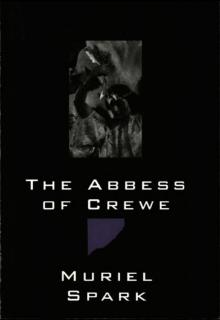 The Abbess of Crewe: A Modern Morality Tale
The Abbess of Crewe: A Modern Morality Tale Reality and Dreams
Reality and Dreams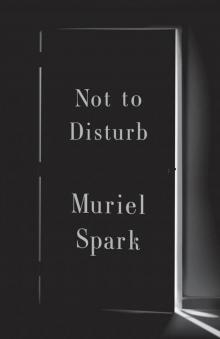 Not to Disturb
Not to Disturb The Prime of Miss Jean Brodie
The Prime of Miss Jean Brodie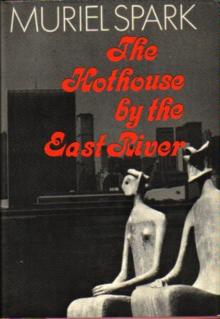 The Hothouse by the East River
The Hothouse by the East River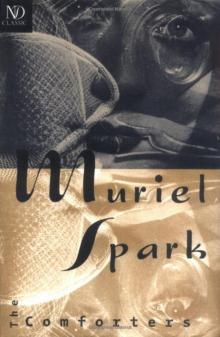 The Comforters
The Comforters (1958) Robinson
(1958) Robinson Unknown
Unknown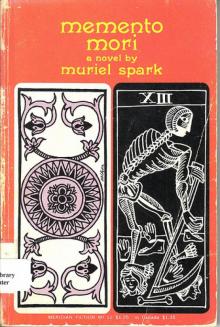 Memento Mori
Memento Mori The Finishing School
The Finishing School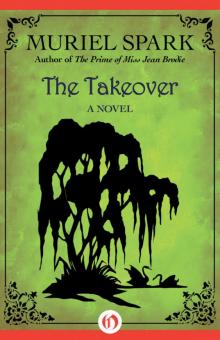 The Takeover
The Takeover Territorial Rights
Territorial Rights The Complete Short Stories
The Complete Short Stories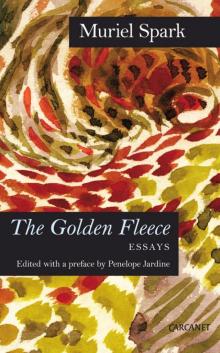 The Golden Fleece: Essays
The Golden Fleece: Essays The Ballad of Peckham Rye
The Ballad of Peckham Rye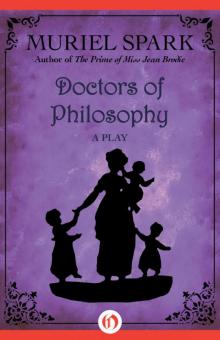 Doctors of Philosophy: A Play
Doctors of Philosophy: A Play The Mandelbaum Gate
The Mandelbaum Gate Loitering With Intent
Loitering With Intent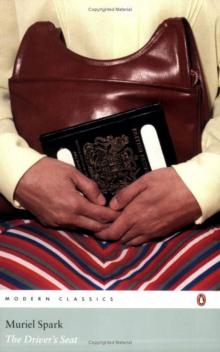 The Driver's Seat
The Driver's Seat Complete Poems: Muriel Spark
Complete Poems: Muriel Spark Symposium
Symposium Aiding and Abetting
Aiding and Abetting The Golden Fleece
The Golden Fleece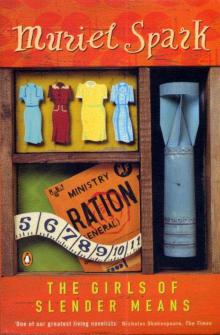 The Girls of Slender Means
The Girls of Slender Means Alice Long’s Dachshunds
Alice Long’s Dachshunds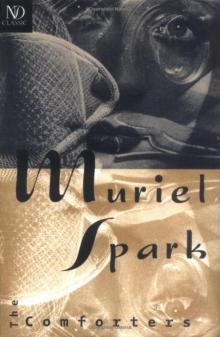 (1954) The Comforters
(1954) The Comforters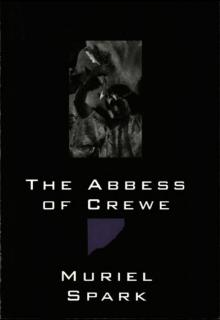 The Abbess of Crewe
The Abbess of Crewe Curriculum Vitae
Curriculum Vitae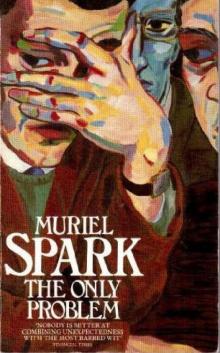 The Only Problem
The Only Problem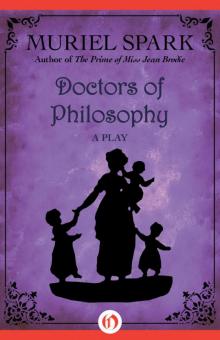 Doctors of Philosophy
Doctors of Philosophy